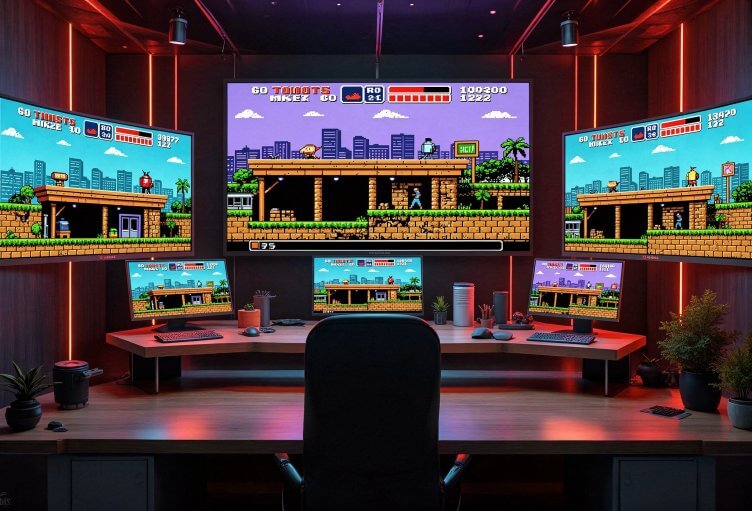Video games have come on a long evolutionary path, each step of which was a certain gaming platform. The power and capabilities of the platforms have increased, pushing the limits of the games themselves. We can easily trace this path from the arcade machine to today’s next-gen consoles.
These days, with the right hardware (or even without it, say hello to cloud gaming), each of us can enjoy ultra-realistic games that would have been unthinkable with the hardware of, say, five years ago. And, of course, choosing the right platform for your game is critical to its potential success.
Some fresh insights. Newzoo (the world’s leading provider of games insights) says that in 2022, the mobile segment dominated the market with a revenue share of 50%. This trend will continue over the next few years due to the increasing penetration of smartphones around the world.

As for the eternal confrontation between the PC and the console, at this stage, it has rather shifted towards intra-platform confrontation. And while the PS5 butts heads with the Xbox Series X and Nintendo Switch amid a 38% year-to-date drop in overall console sales, global PC shipments will fall by 9.5% through the end of 2022. This is what Gartner says.

However, that hasn’t stopped the flow of new games being released. The PC vs. console confrontation has also been somewhat blurred given the fact now most modern games are delivered simultaneously for both PC and console. God of War: Ragnarök, Gotham Knights, Overwatch 2, The Callisto Protocol, and Call of Duty: Modern Warfare 2 − we are waiting for you.
Therefore, we suggest that you peacefully step back from platform battles and take a relaxed look at the main gaming platforms, their advantages and prospects.
What Are Video Game Platforms?
So what is a gaming platform?
The gaming platform is an environment with technical and functional capabilities for the execution of gaming software.
Each platform has its own features and limitations that you need to consider when creating a game.
In the early days of gaming platforms, the market was dominated by the unchanging pair of PCs and consoles. However, in recent years, mobile devices have come to the center of the arena and now dominate the market. AR/VR technologies and cloud gaming also contribute to the development of gaming platforms, although not to such a large extent. But let’s talk about everything in order.
The Most Famous Gaming Platforms
There are two broad categories of video game platforms − portable and non-portable. As the name implies, portable devices are those that can be carried with you anywhere, while non-portable devices are tied to a specific location.
| Portable gaming platforms | Non-portable gaming platforms |
| Handhelds and mobile devices | PC and consoles |
In addition to mobile devices, today’s top gaming platforms are PC and three brands of consoles − Xbox, PlayStation, and Nintendo.
PC

PC gaming platforms are considered to be one of the strongest in the video game industry. This is confirmed by the State of the Game Industry report, which is compiled under the auspices of the Game Developers Conference by polling several thousand developers. Survey data for 2021 showed the advantage of the PC − 58% of game developers chose it. The same number said that their latest project was released on PC and that their current project was planned for PC. So in the next ten years, nothing threatens the PC: it has its own reliable niche and a huge pool of followers.
Why do developers prefer PCs? Thanks to the widest functionality and opportunities that this platform offers.
Why do players prefer PCs? Because PCs:
- represent games in the best possible state in terms of performance and visual fidelity;
- offer cheaper games compared to consoles, plus there are frequent sales and giveaways on Epic Games Store and Steam;
- are easy to upgrade either completely or piecemeal;
- offer amazing customizable gaming experiences through various accessories;
- grant access to streaming channels;
- present an endless universe of online gaming.
Yes, and many legendary games like World of Warcraft are only available for PC. So it’s no surprise that no matter what, the PC remains the most popular gaming platform.
Console

Returning to the State of the Game Industry, we see that the second place of honor is occupied by consoles. More precisely, PlayStation 5, which was chosen by 44% of developers. It is followed by Nintendo Switch (38%) and Xbox Series X/S (30%).
We have prepared for you a small bonus table of the main pros and cons of the latest console models from 3 top brands.
| Pros | Cons | |
| PlayStation 5 | ✔ Advanced controller ✔ Lightning-fast loading time ✔ 4K graphics at 60 FPS | ✘ Fairly large physical size ✘ Little internal storage (~667 GB) ✘ User interface issues |
| Xbox Series X | ✔ Modern compact design ✔ Simple storage expansion process ✔ Incredibly quiet | ✘ Few exclusive games ✘ Little internal storage (800 GB available) ✘ User interface issues |
| Nintendo Switch | ✔ Small and portable ✔ Extended OLED screen ✔ Playable on TV or handheld screen | ✘ Little game library ✘ No 4k options ✘ No backward compatibility |
PlayStation
There are many consoles, but only one has managed to get into the Guinness Book of Records. In 2019, the Sony PlayStation family of game consoles received an award from the Guinness Book of Records as the best-selling home game console brand in history. According to data from 1994 to 2019, the total sales of all four generations of home game consoles, including original PlayStation, PS2, PS3, and PS4, exceeded 450 million units.
The secret to the console’s popularity can be described in several points:
- Its ongoing commitment to technological innovation.
- Sensitive response to user feedback.
- Sleek and elegant design compared to Xbox One and Nintendo.
- Tha large list of exclusives not available for PC.
- Huge piles of games in the library (over 3,000 for PlayStation 4 and already over 500 for PlayStation 5).
Console fans will be able to add dozens more points. But these are quite enough to understand the big picture.
Xbox
Xbox is a home video game console developed and released by the American company Microsoft in 2001. The time was risky, competitors in the form of PlayStation 2 and Nintendo GameCube posed a big threat to the newcomer to the market. But everything ran like clockwork: by the end of 2001, over one and a half million consoles had been sold. Its success was also fueled by strong public interest in the multiplayer shooter Halo: Combat Evolved, developed by Bungie exclusively for Xbox.
A characteristic feature of Xbox is backward compatibility (PlayStation has problems with this). New consoles support old games from the very first Xbox. Some of these games are even enhanced for Xbox One X with higher resolutions and faster frame rates than the original version of the game.
As for the fresh effervescent PS5 vs. Xbox Series X confrontation, many still cannot decide which console is better. Many PS fans have turned toward Xbox thanks to its more powerful hardware and more user-friendly game subscription service. On the other hand, PS still leads in terms of the number of games in the library. How will the next generation of consoles surprise us − who knows.
Nintendo Switch
Nintendo was founded back in 1889. However, its most popular console, Nintendo Switch, is quite young, having been released in 2017. Since then, it has made a lot of noise as it has managed to break down the barrier between handheld gaming platforms and home consoles. No console offered players the opportunity to enjoy AAA games like Doom: Eternal on the go. And hosting a Switch party with friends is a breeze thanks to its versatile portability.
Nintendo has its own list of exclusives: Zelda, Splatoon, Super Mario Bros., and so on. Many popular Nintendo games like Animal Crossing: New Horizons or Pokémon Sword and Shield have sold over 20 million copies each. Games for this console are distributed on special cartridges or downloaded from Nintendo eShop. As of October 2020, over 4,400 games were available for Nintendo Switch. Which is not so little, given the relatively recent appearance of the console.
Mobile

As we’ve already said, the mobile platform now dominates the market. Access to a smartphone for most people is a much more realistic option than access to expensive consoles and PCs. The spread of mobile devices around the world and the growing interest of people in mobile games have led to the fact that many famous PC titles have been ported to smartphones. These are Grand Theft Auto, Call of Duty Mobile, and, of course, battle royales like Fortnite and PlayerUnknown’s Battlegrounds Mobile.
With the development of the technological filling of smartphones, mobile games are gaining more and more visual appeal and performance capabilities. Many smartphone manufacturers have begun to release devices focused specifically on games. And finally, some interesting mobile statistics from trusted authoritative sources:
- Newzoo says that by 2023, the number of mobile players worldwide will exceed 3.7 billion people.
- Statista says that by the end of 2022, Puzzle Games’ total global revenue will exceed $21 billion.
- SensorTower says that by 2025, 71% of Google Play revenue will come from mobile games (42% for App Store).
Bonus Alternatives: Cloud Gaming and AR/VR

Even though only 6% of developers showed interest in developing for the Google Stadia streaming platform according to the survey already mentioned, cloud gaming, also referred to as the main representative of online gaming platforms, does not suffer much from this.
Cloud gaming does not yet play a key or significant role in the gaming market. But that’s just for now. Being one of the main trends of the coming years, it may well make the leap from an underestimated niche technology to a market trendsetter.
Due to the ease of operation and economic benefits of cloud gaming, major players are seriously thinking about entering this market. For example, Electronic Arts will soon release its cloud gaming portfolio and is testing the performance of its cloud gaming services. The global cloud gaming market size was $691.6 million in 2021 and the compound annual growth rate is expected to increase by 45.8% between 2022 and 2030.
Among the well-known cloud gaming providers, in addition to the already mentioned Google Stadia, there are Nvidia GeForce, Xbox Game Pass, Playstation Now, and Amazon Luna.
When it comes to VR and AR, there was some decline: in 2020, the percentage of developers working on a VR/AR game was 46%, and in 2021 it dropped to 38%. However, it was Oculus Quest that was chosen as the virtual reality platform that aroused the greatest interest among 52% of developers surveyed.
Which Gaming Platform Is Best for You?
Choosing the best gaming platform for your goals, you should first of all build on your capabilities. Do you have the budgets and team to create a major AAA title? Or maybe you and your friend are an indie team planning to start a crowdfunding project to raise funds for a new game?
In your case, the best platform for gaming is the platform where your capabilities match your desires. With a small budget, it will not be possible to create a large-scale open world game. But you can create an exciting mobile title or a very good indie game for PC.
Another topical issue is how to understand whether a game needs to be released simultaneously for PC and console. So, for example, did the developers of the recent summer hit Stray.

Stray is a third-person quest game in a post-apocalyptic cyberpunk setting, the main feature of which is that the player takes on the role of a cat. The indie studio has been making the game for 7 years – it turned out to be a worthy A-level title released for PC and PS4/PS5 consoles. Thus, the developers have covered a much larger audience of players. But remember that such a choice lengthens production and increases its cost. Weigh the pros and cons before deciding if you need a particular audience.
If you still experience difficulties and are confused about the advantages and disadvantages of different types of video games platform, then contact us. With more than 10 years of experience in the gaming market, we have been creating games for a variety of platforms. After evaluating your idea and potential audience, we will help you decide on a platform and, if necessary, take an active part in the creation of your title.








